List of English words of Sanskrit origin – Part 5 of Part 7 | English words originated (derived) from Sanskrit | List of English words taken from Sanskrit | List of English corrupted words taken from Sanskrit
Namaste friends, how are you doing today? Welcome to #BhagavanBhakthi website / blog.
Bhagavan Lord Sri Krishna (Vishnu) (Rama) blessings to you and your family!
In this website / blog, you will always learn about #Hinduism #Sanskrit language.
Also subscribe to my YouTube channel from this link #BhagavanBhakthi to view videos about #Hinduism #Sanskrit language.
Just before going to “List of English words of Sanskrit origin – Part 5 of Part 7 | English words originated (derived) from Sanskrit | List of English words taken from Sanskrit | List of English corrupted words taken from Sanskrit“, let us know a brief, basic and very important information.
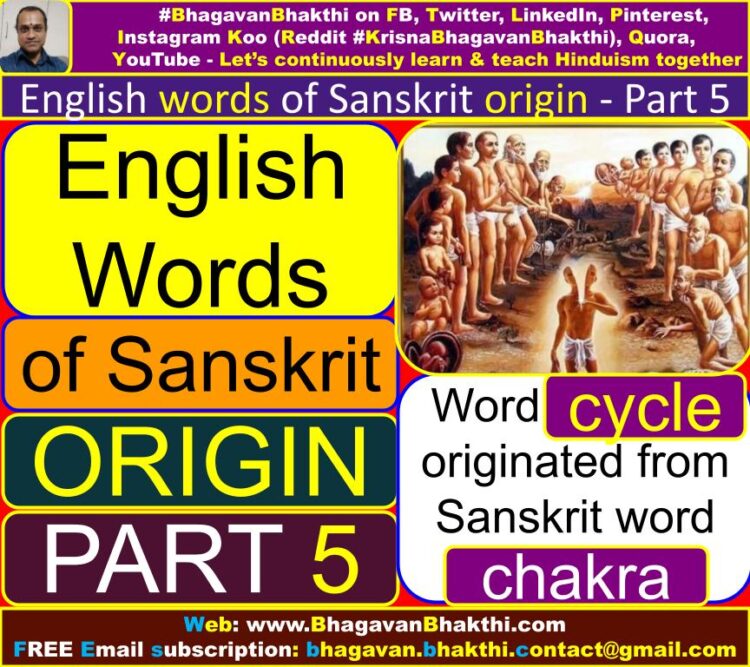
In post your will know about these : List of English words of Sanskrit origin, List of English words derived from Sanskrit, List of English words taken from Sanskrit, List of English corrupted words taken from Sanskrit, etc.
List of English words of Sanskrit origin (Part 5 of Part 7) are as given below:
Suck / sucking : In Sanskrit suck / sucking means ‘cUS / cUSati’ (read as choosh / chooshati). cUS = choosh = suck. Translations (to use the mouth to pull in (liquid etc.)) French: sucer German: saugen Italian: succhiare, suggere Portuguese: chupar, sugar Russian: сосать Spanish: chupar, sorber.
Center / centre : In Sanskrit center / centre means kendra / kendre. Europeans pronounce Sanskrit words differently. Translations (point on a line midway between the ends) French: centre, milieu German: Mitte, Mittelpunkt, Zentrum Italian: centro Portuguese: centro Russian: центр Spanish: centro
Cycle / circle : In Sanskrit cycle / circle means chakra. Both the English words have been derived from the Sanskrit word. Consort : In Sanskrit consort means ‘kalatra‘. Translations (husband, wife, companion or partner) Russian: супруг Spanish: consorte.
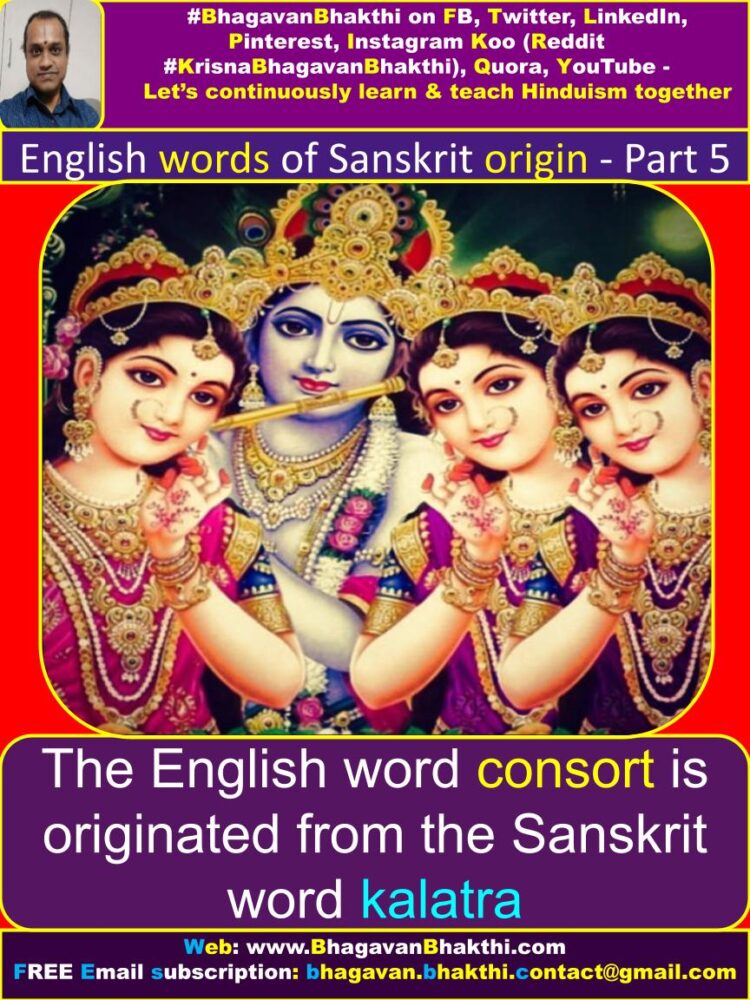
Practice : In Sanskrit practice means ‘prayatna‘ / ‘pravRtti’ (read as pravrutti). Translations (repetition of an activity to improve skill) French: pratique German: Übung, Üben Italian: pratica Portuguese: prática Russian: практика Spanish: práctica.
Progress : In Sanskrit progress means ‘pragati‘. Translations (a moving forward) French: progrès, amélioration German: Fortschritt Italian: progresso Portuguese: progresso Russian: прогресс Spanish: progreso.
Peel : In India few words for peel is ‘cheel, seelu’ etc. The English word peel is very close to the Indian words. Translations (to remove skin) French: (peach,onion) peler, ( vegetable,fruit) éplucher, (crustacean) décortiquer German: schälen Italian: pelare, sbucciare Portuguese: descascar Russian: очищать Spanish: pelar.
Plate : In Sanskrit plate means paTTikA or pAtrI. Also we have another word for plate in Sanskrit called ‘Phalaka‘. Translations (dish from which food is served or eaten) French: (eating dish) assiette, (serving dish) plat German: Teller Italian: piatto Portuguese: prato Russian: тарелка Spanish: plato.
Spark : In Sanskrit spark means ‘spulliGga‘. Carpenter : In Sanskrit carpenter is called as ‘kASThatakS‘ (read as kashtthataksh). A miss pronounced word.
Translations (carpentry person) French: menuisier, charpentier German: Zimmermann, Schreiner, Tischler, Bauschreiner (Swiss German) Italian: carpentiere, falegname Portuguese: marceneiro, carpinteiro Russian: плотник Spanish: carpintero, ebanista.
Brain : In Sanskrit ‘bhrAnta / bhrAnti’ means related to brain. Valour : In Sanskrit valour means ‘vikrama / vikram’. Translations (Strength of mind in regard to danger) French: héroïsme, courage Russian: доблесть Spanish: valor.
Due : In Sanskrit due means ‘deya / dey’. Translations (owed or owing, to be paid by the stated time) French: dû, due, dû German: fällig Russian: подлежать оплата (podležáščij opláte), причитаться.
Tremble : In Sanskrit tremble means ‘trasati‘. Translations (to shake) French: trembler, vibrer German: zittern Italian: tremare, tremolare Portuguese: tremer Russian: дрожать Spanish: temblar.
Motion : In Sanskrit motion means ‘yamanam / yamana’. yaman = ya + man = ya + motion = motion. Translations (state of progression from one place to another) French: mouvement German: Bewegung Italian: movimento Portuguese: movimento Russian: движение Spanish: movimiento.
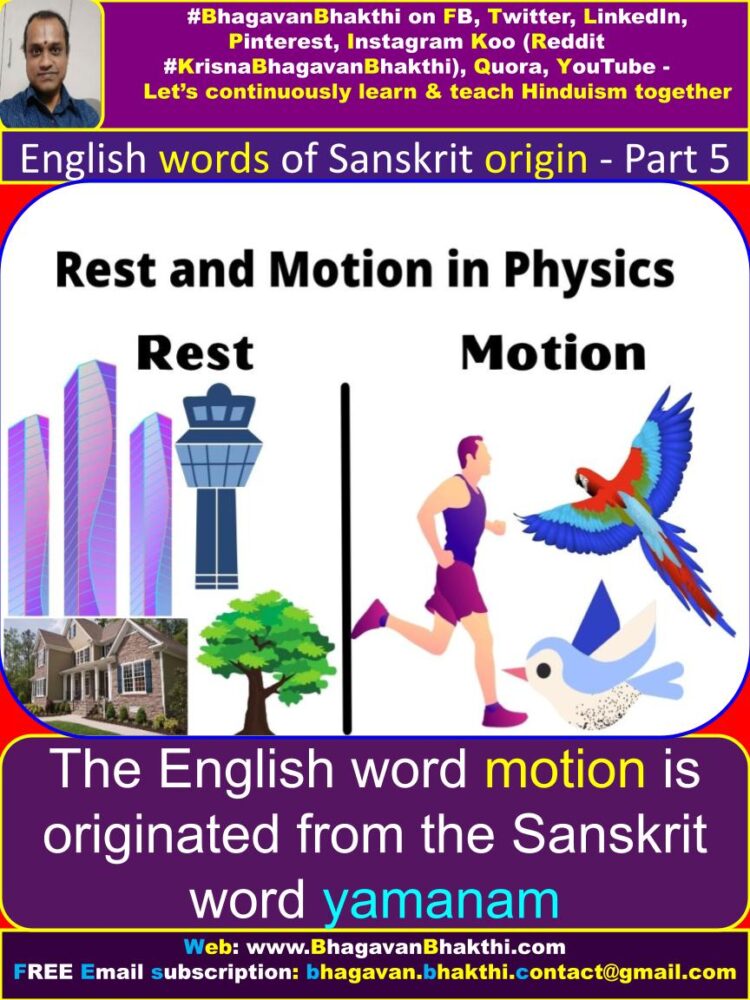
Fly / flight : In Sanskrit fly or flight means ‘palAyati / palAya / palAy’ (read as palaayati / palaaya / palaay). We should remember that many times the Europeans use ‘fa’ for ‘pa’. Example is the Sanskrit word ‘pithru’ is father in English.
Trouble : In Sanskrit trouble means ‘tApayati / tApayat or simply it is called ‘tApa or tAp (read as taap). Consume : In Sanskrit consume means ‘khAdaka / khAdak’. Roy : Its a surname in English language. Dictionary meaning of ‘Roy’ means ‘a king’ or ‘royal’. We all know in Sanskrit ‘rAyaru / rAya / rAy’ means king or royal empire. Everything has come from Sanskrit.
Thirst : In Sanskrit thirst means ‘trSA / trS’ (read as trushaa / trush). Drum (musical instrument drum) : In Sanskrit drum means ‘Damaru / DhakkA’ (read as Damaru / Dhakkaa). Kettle : In Sanskrit kettle means ‘karakI‘ (read as karakii).
Jug : In Sanskrit jug means ‘ghaTa / ghaT’. Here if jug is pronounced in Sanskrit style then it would be ‘jag’ and not jug. Inferior : In Sanskrit inferior means ‘hInata‘ (read as hiinata). Establish : In Sanskrit establish means ‘sthApita‘. Very clearly the english word is a corrupted form of the samskruta word.
Dejected : In Sanskrit dejected means ‘dInacitta‘ (read as diinachitta). View : View is the simple form of the Sanskrit word ‘vIkSaNa‘ (read as viikshanha). Clearly a corrupted word. Set : In Sanskrit set means ‘asta / ast’. Just a mispronounced word from Sanskrit word.
Sunset : Earlier we have seen that the English word sun is taken from the Sanskrit word ‘surya’ and the English word set is taken from the Sanskrit word ‘asta / ast’. Thus sunset is taken directly from the Sanskrit word ‘suryAsta‘ (read as suryaasta).
Hit : In Sanskrit hit means ‘hataka / hatak / hanti / hant’. All these words has the same meaning as the English word hit. Hai / Hi / Hello : All these English words has the same meaning. The Sanskrit word for these words is ‘hai’.
For example while speaking in Hindi we tell, “hai idhar aao”, or in Kannada if we need to call somebody we call that person as ‘hai, baaro illi’.
Preach / preacher : In Sanskrit preacher means ‘prachAraka / prachArak. Translations (one who preaches) French: prédicateur German: Prediger Italian: predicatore Portuguese: pregador Russian: проповедник Spanish: predicador.
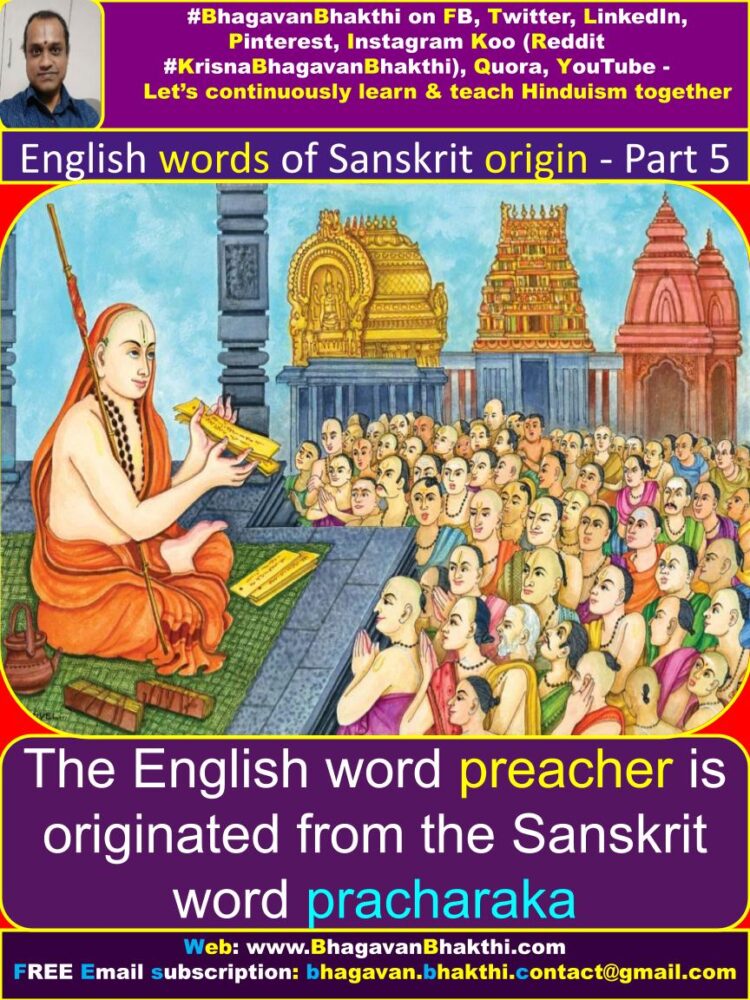
Project (projection) : In Sanskrit project (projection) means ‘prodgata‘. Translations (something which projects) French: saillie German: Vorsprung Portuguese: projeção Russian: выступ Spanish: protuberancia. Wide : In Sanskrit wide means ‘vistAra / vistAr’.
Cover (covering / protecting) : In Sanskrit cover means ‘kavach‘. Praise : In Sanskrit praise means ‘prazaMsA‘. Praise is the short form of the Sanskrit word. Conscious : In Sanskrit conscious means ‘chaitanya‘. Translations (alert, awake) German: bei Bewusstsein Italian: cosciente Russian: находяшийся Spanish: consciente.
Another : In Sanskrit another means ‘anyata / anyatara / anyatra / anya’. Somehow : In Sanskrit somehow means ‘samaha‘. Crown : In Sanskrit crown means ‘kirITa / kirIT’. Humble : In many Indian languages humble means ‘hambala / hambal’.
Slave : In Sanskrit slave means ‘sevakam / sevaka / sevak’. Foreigner : In Sanskrit foreigner means ‘paradezi‘ (read as paradeshi). We have already seen that Europeans use ‘fa’ instead of ‘pa’ which is been used in Sanskrit. Big example is in English ‘father’, whereas in Sanskrit it is ‘pithru’.
Mare (female horse) : In Sanskrit mare means ‘mayI‘ (read as mayii). Brown : In Sanskrit brown means ‘babhruka / babhruk’. Rope : In Sanskrit rope means ‘rajju‘.
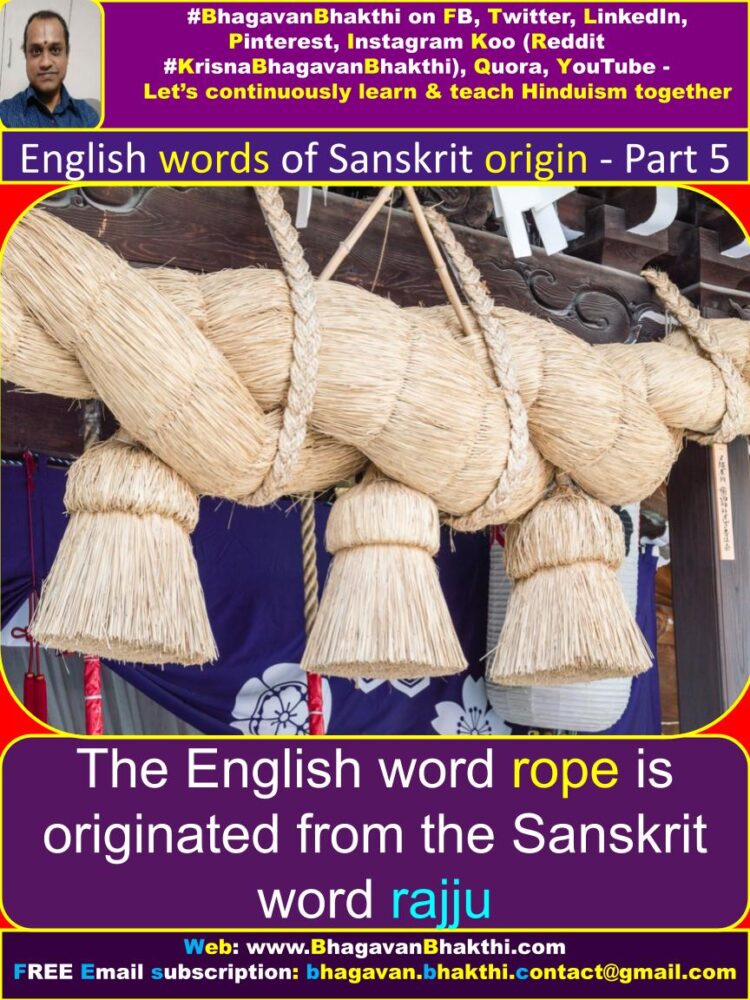
Slogan : The Sanskrit word for slogan is ‘shlokam / shloka / shlok’. Fan : In Sanskrit fan means ‘pankha‘. We should always remember that wherever we use ‘pa’, Europeans use ‘fa’. Classical example is ‘pithru’ in Sanskrit is ‘father’ in English.
Community : In Sanskrit community means ‘samudAyam / samudAya / samudAy’. samudAya = samu + dAya = commu + dAya = community = samudAya. Part : In Sanskrit part means ‘prati‘. In Kannada we all use this word like ‘prati ondu’. Similarly in Hindi we use as ‘prati ek’. It is same in English too. Example is ‘every part’.
Partiality : In Sanskrit partiality means ‘pakshapAta‘ (read as pakshapaata). Party (like a political party) : In Sanskrit party means ‘paksham / paksha / paksh’. Letter : In Sanskrit letter means ‘lekha‘.
Debt : In Sanskrit dept means ‘dhAra / dhAr’ (read as dhaara / dhaar). In sanskrit dhAra means flowing. Family : In Sanskrit family means ‘parivAram / parivAra / parivAr’ (read as parivaaram / parivaara / parivaar). Many times earlier we have seen, wherever ‘pa’ is used in sanskrit, at the same place ‘fa’ is been used in English.
Prohibit : In Sanskrit prohibit means ‘pratiSidh‘ (read as pratishidh). In sanskrit there is another word for prohibit, that is ‘nisheda’. Success: In Sanskrit success means ‘saphalata / saphala / saphal’.

Lament: In Sanskrit lament means ‘lAlapyate / lAlapya’ (read as laalapyate / laalapya). Master : In Sanskrit master means ‘mahAntam / mahAnta / mahAnt’. Station : In Sanskrit station means ‘stAnaka / stAnak’. Many of us know that in samskruta ‘stana / stan’ means a place. And ‘tangu stAna’ means a place to rest. Thus station is directly taken from Sanskrit.
Stationary / standing : In Sanskrit stationary / standing means ‘stAyin / stira’. Table : In Sanskrit table means ‘pIThika‘ (read as piiThika). Here very clearly the English word is mispronunciation of the Sanskrit word. Pale : In Sanskrit pale means ‘pANDu‘ (read as paanDu).
Shrub / bush : In Sanskrit shrub means ‘kSupA / kSup’ (read as kshupaa / kshup). Camel : In Sanskrit camel means ‘kramelaka / kramelak’. Knot : In Sanskrit knot means ‘kandi‘. In Kannada knot means ‘ganTu’. In Hindi knot means ‘gaaTh’. All these words are taken from Sanskrit word.
State : In Sanskrit state means ‘stAna‘. Mirror : In Sanskrit mirror means ‘makura / makur’. Other words for mirror in Sanskrit are ‘bimba’, ‘darpana’.
Seer : In Sanskrit seer means ‘RSi‘ (read as rhushi). Very clearly we can understand that seer is the short form of ‘rhushi’ (Rishi) = rhu + shi = rhu + see = rhu + seer = seer. Mist : In Sanskrit mist means ‘mihikA / mihik’ (read as mihikaa / mihik).
Vapour : In Sanskrit vapour means ‘vAyuvAha‘. Quake: In Sanskrit quake means ‘kampana‘. If quake is written in Indian / samskruta style, then it would be like this – quake = qua + ke = kava + ke.
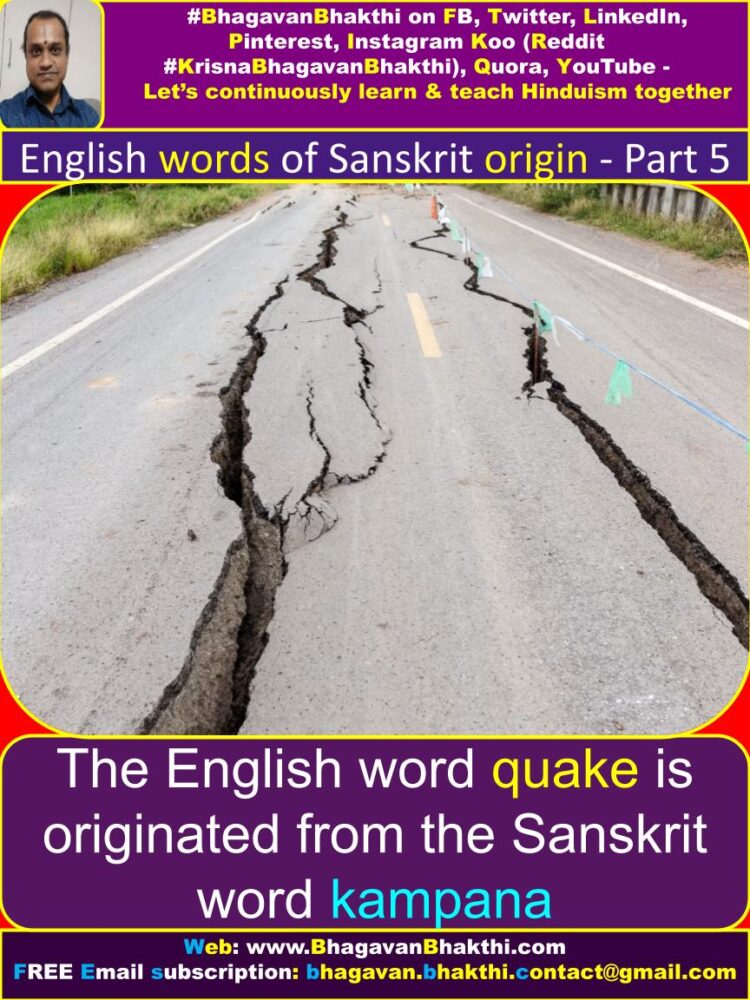
Cause : In Sanskrit cause means ‘kAraNa‘. If the English word cause is written in Sanskrit style, then it would be like this, cause = ca + va + sa = ka + va + sa = ka + ra + sa = kAraNa (read as kaaranha).
Frog : In Sanskrit frog means ‘plava‘. I have been always telling that Europeans use ‘fa’ instead of ‘pa’ as used in samskruta. plava = pla + va = fro + va = frog. Possess : In Sanskrit possess means ‘poSati‘ (read as poshati).
Flourish : In Sanskrit flourish means ‘phullati / phulla / phull’. We should always remember that wherever ‘pa’ is been used in Sanskrit, their ‘fa’ is been used in English. Happy : In Sanskrit happy means ‘harsha / harsh’.
Garlic : In Sanskrit garlic means ‘grantimUla‘ (read as granthimoola). This English word is a short and corrupted version of the Sanskrit word. Another word for garlic in Sanskrit is ‘lazuna’ (read as lashuna).
Mould : In Sanskrit mould means ‘moDaha / moDah / moD’. Even today in many Indian languages we use this word. In Hindi or Marathi or in many north Indian languages we still use this word.
Offer : In Sanskrit offer means ‘upakAram / upakAra / upakAr’ (read as upakaaram / upakaara / upakaar’.
Gather : In Sanskrit gather means ‘grhNAti / grhNAt’ (read as gruhnhaati / gruhnhaat). Another word for gather in samskruta is ‘sangraham / sangraha / sangrah’. This word is also very close to the English word gather. sangrah = San + gra + ha = gra + ha = gather.
We should always remember, Europeans like to make things easier. Just like the Indian word ‘odakamandalam / odakamandala’ (a place in Tamil nadu, India) was made ‘ooty’ by English people. Off course now ooty’s name has been changed back its original name.
Also ‘Bendakaaluru’ had become Bangalore. Now our government have renamed this place as ‘Bengaluru’, which is the silicon valley of India.
Early : In English the meaning of early is something first or before. In Sanskrit first or early means ‘Arambam / Aramba / Aramb’ (read as aarambam / aaramba / aaramb).
The word early when pronounced it looks like ‘arly’. This means ‘a’ is used rather than ‘e’ as used in the English word early. Give attention towards pronunciation, rather than spelling.
Dear : In Sanskrit dear means ‘dayita / dayit’. Another word for dear in samskruta is ‘priya’.
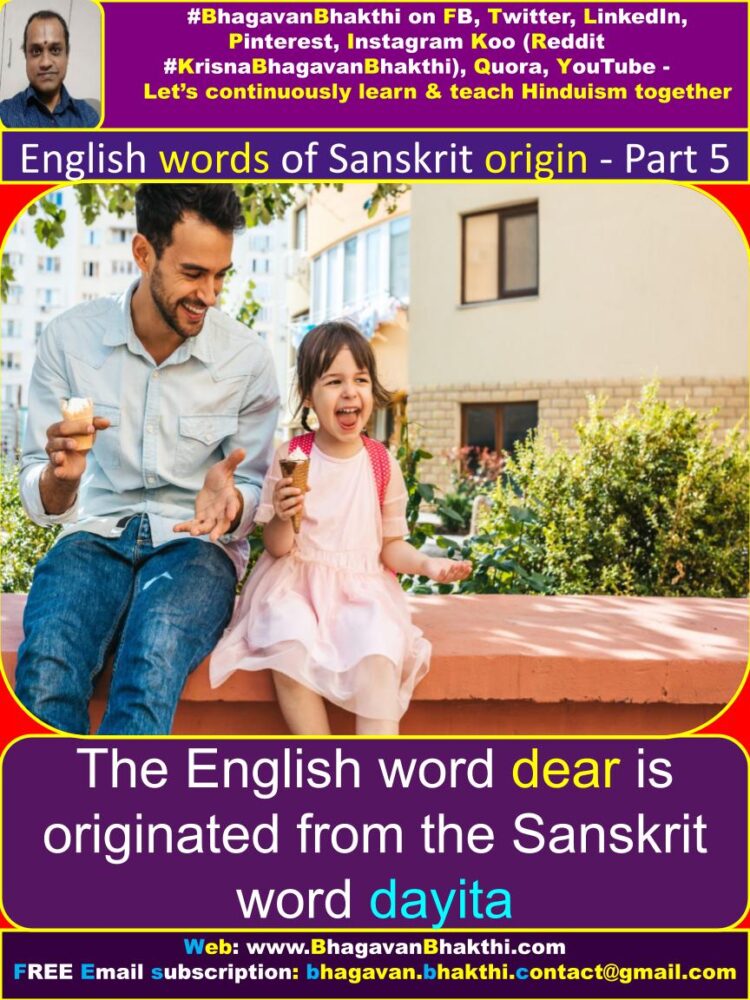
Shell : In Sanskrit shell means ‘salilaja / salilaj’. Many of us know Europeans like to make things easy. Just like ‘Bendakaaluru’ was made ‘Bangalore’. Play : In Sanskrit play means ‘paNam / paNa / paN’ (panham / panha / panh’. Very clearly another corrupted word and miss pronounced.
Authority : In Sanskrit authority means ‘adhikAri / adhikAr’ (read as adhikaari / adhikaar). Agent : In Sanskrit agent means ‘Ayukta / Ayukt’ (read as aayukta / aayukt’). Plenty : In Sanskrit plenty means ‘parINas‘ (read as pariinhas).
Abundant / Abundance : In Sanskrit this word means ‘adhikam / adhika / adhik’. Coffee : In Sanskrit coffee means kapipaana or ‘kAphi’ (read as kaaphi). Juice : In Sanskrit juice means ‘Urj‘ (read as oorj).
Live (to be living / life) : In Sanskrit live / living means ‘jIva‘ (read as jiiva). Here live is a simple form of the Sanskrit word jIva. jIva = lIva (liiva) = live. Saline / salt : In Sanskrit saline or salt means ‘kSAra / kSAr’ (read as kshaara / kshaar). A tongue twister.
Simple : In Sanskrit simple means ‘saralam / sarala / saral’. Vowel (a sound produced by the vocal cords) : In Sanskrit vowel means ‘svaram / svara / svar’. Many times earlier we have seen that Europeans can’t pronounce a difficult word and they tend to make it simple.
Here if we take the Sanskrit word svaram = sva + ram = va + ram = vowel. Its not easy to spell ‘sva’. Thus Europeans to keep this word simple they made it ‘va / vo’ to make a whole word as vowel.
Bark (dog barking) : In Sanskrit bark / barking means ‘bukkana / bukkan’. Noise : In Sanskrit noise means ‘nAda / nAd’ (read as naada / naad). Perpetual : In Sanskrit perpetual means ‘pratikAlam / pratikAla / pratikAl’ (read as pratikaalam / pratikaala / pratikaal).
Moment : In Sanskrit moment means ‘muhurtam / muhurta / muhurt’. Stop : In Sanskrit stop means ‘stobhati / stira / stir’. Textile : In Sanskrit thread means ‘tanti’. Thus doing work using tanti is textile. In Sanskrit textile means ‘tantikArya‘.
Practical : In Sanskrit practical means ‘prayokAtmaka / prayogAtmak’. Chief : In Sanskrit chief means ‘shreSTha‘ (read as shreshttha). Always remember, Europeans can’t pronounce hard words like above.
Also they want to make things easy and small. shreshttha = shresh + ttha = chresh + ttha = chief + ttha = chief. Another word for chief in Sanskrit is ‘pradAna’.
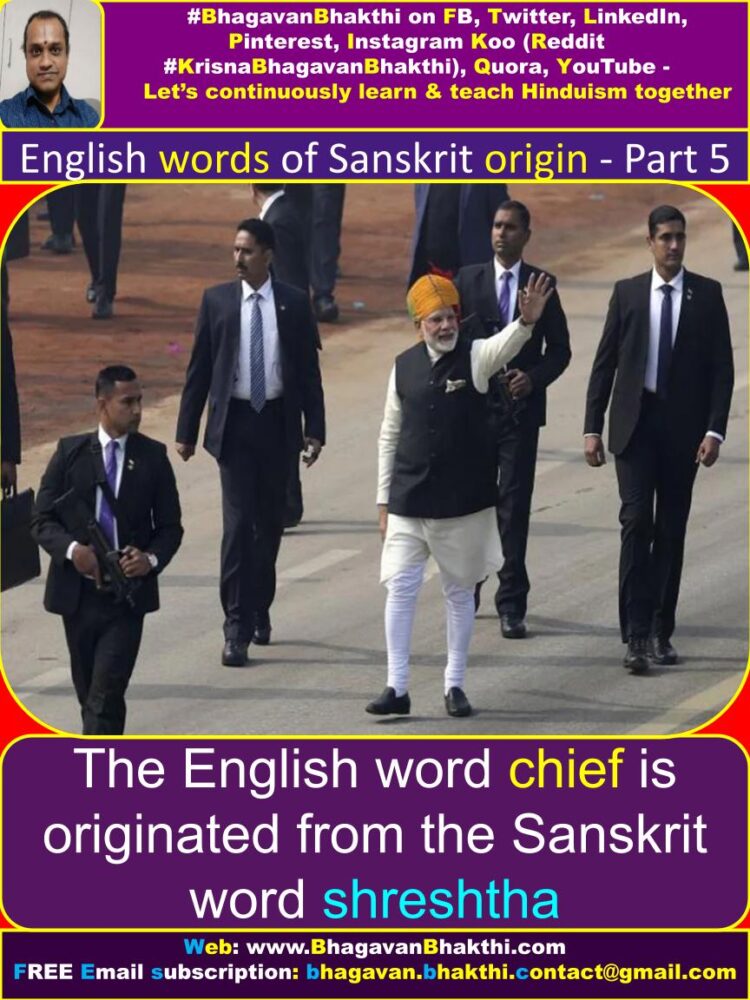
Poor : In Sanskrit poor means ‘durgati‘. durgati = dur + gati = poor + gati = poor. Again pronunciation difference. Also in Sanskrit poor means ‘daridra’. True / Truth : In Sanskrit true / truth means ‘tattva‘.
Section : In Sanskrit section (a part of cut or hole) means ‘chedah / cheda / ched’. ched is little difficult word to pronounce. ched = sect. Europeans love making things easier. Chapter : In Sanskrit chapter means ‘stabaka / stabak’. In Sanskrit chapter has other different words too like ‘adhyaya / skanda etc.
Appendix : In Sanskrit appendix means ‘adhyAsa / adhyAs’. Virtually : In Sanskrit virtually means ‘vastustiti‘. Sacrifice : In Sanskrit sacrifice means ‘sAttram / sAttra / sAttr’ (read as saattram / saattra / saattr). Tank : In Sanskrit tank means ‘taDaga / taDag’.
Pool : In Sanskrit pool / pond means ‘palvala / palval’. Pond : In Sanskrit pond means ‘puSkara / puSkar’ (read as pushkara / pushkar). Building : In Sanskrit building means ‘bhavanam / bhavana / bhavan’. Daily : In Sanskrit daily means ‘dainika / dainik’.

Partition : In Sanskrit apart means ‘pRthak‘ (read as prhruthak). Custom : In Sanskrit custom means ‘kramam / krama / kram’. Search : In Sanskrit search means ‘samIkSa / samIkS’ (read as sameeksha / sameeksh).
Meridian : In Sanskrit meridian means ‘madhyandinIya‘ (read as madhyandiniiya). Puppet : In Sanskrit puppet means ‘puttika‘. Many of us know in many Indian languages, puppet means ‘kaTputliya’.
Dictionary : In Sanskrit, dictionary means ‘deekshitam / deekshita / deekshit’. deekshita means, to give lessons. Same holds good to the English word dictionary. Axle : An axle of the two wheels. In Sanskrit axle means ‘akSam / akSa / akS’ (read as aksham / aksha / aksh). In Sanskrit aksha also means eyes and axis.
Crab : In Sanskrit ‘karkaTa or karka’ means crab. Very clearly a directly corrupted word. Nipple : In Sanskrit nipple means ‘pippala / pippal’. Another corrupted word.
Muscle : In Sanskrit muscle means ‘mAmsapeshi / mAmaspesh’ (read as maamsapeshi / maamsapesh) or simply sometimes it is called ‘mAmsa / mAms’ (read as maamsa / maams’.
Wail : In Sanskrit wail means ‘vilApa‘ (read as vilaapa). vilaapa = vil + aapa = wail. Another shortcut word. Paradise : In Sanskrit swargaloka means paradise. Also we should note that in Sanskrit ‘paradesha’ means a faraway place.
Cremate : In Sanskrit cremate means ‘kriyakarma / kriyakarm’. Absolutely no question of questioning about this corrupted word.
Fidelity : In Sanskrit fidelity means ‘pAtirvratya‘ (read as paatirvratya). Many a times we have seen that wherever ‘pa’ is been used in Sanskrit, there ‘fa’ is been used in english. Again the classic example is ‘father and pithru’.
Middle : In Sanskrit middle means ‘madhyama / madhyama / madhya’. Directly corrupted word. Sofa : In Sanskrit sofa means ‘shayya‘. Very clearly a mispronounced word.

Proposal : In Sanskrit proposal means ‘prastAva / prastApa’. Agree / agreed : In Sanskrit agree / agreed means ‘angikruta / angikrut’. Another directly copied word. Wear : In Sanskrit wear means ‘vahati / vahata / vahat’.
Foam : In Sanskrit foam means ‘phena / phen’. Many times earlier we have seen that Europeans use ‘fa’, whereas in Indian tradition we use ‘pha / pa’.
Less (useless, worthless etc.) : In Sanskrit ‘nis‘ is used. For example nisprayojaka (means useless), niskArya (worthless). In English they use ‘less’ which is a corrupted form of ‘nis’ in Sanskrit. Saucer : In Sanskrit saucer means ‘zarAvika / zarAvik’ (read as sharaavika / sharaavik). Pronouncing ‘sha’ is more difficult than ‘sa’.
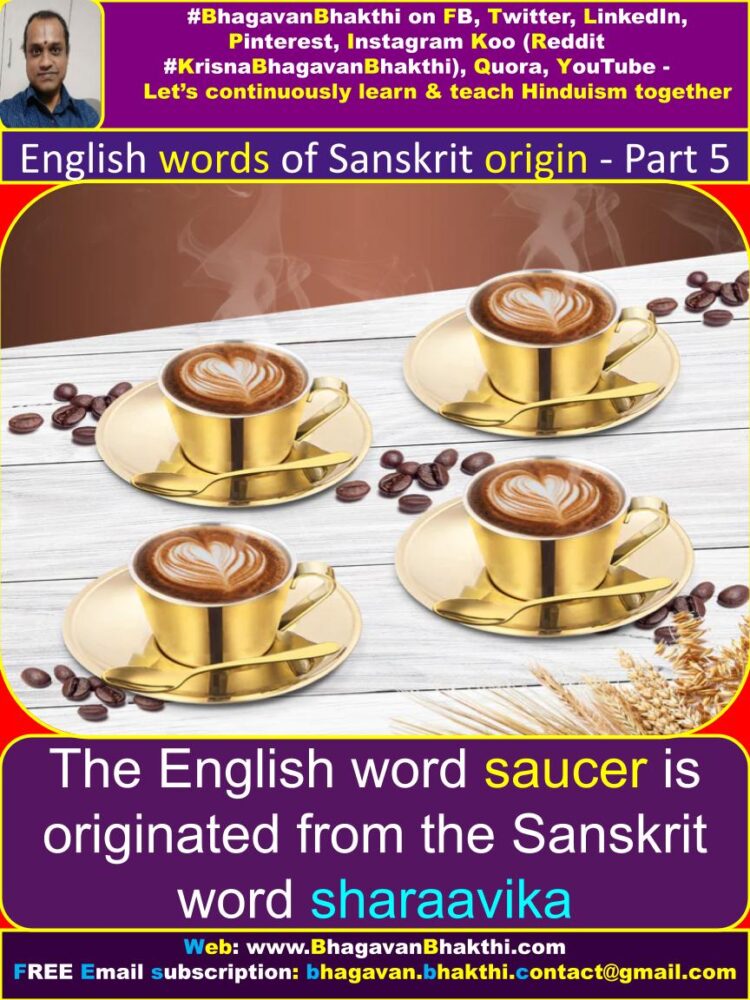
Wet : In Sanskrit wet means ‘utta / utt’. Share (a part of – a lion’s share) : In Sanskrit share means ‘amzakam / amzaka / amza / amz’ (read as amshakam / amshaka / amsha / amsh). Here the English word is a short form of the Sanskrit word. amshaka = am + sha + ka = am + shaka = share.
Spit : In Sanskrit spit means ‘STayUta‘ (read as shTayuuta). This Sanskrit word is very difficult to pronounce. Selfish : In Sanskrit selfish means ‘svArthin / svArthi’ (read as svaarthin / svaarthin). Another mispronounced word.
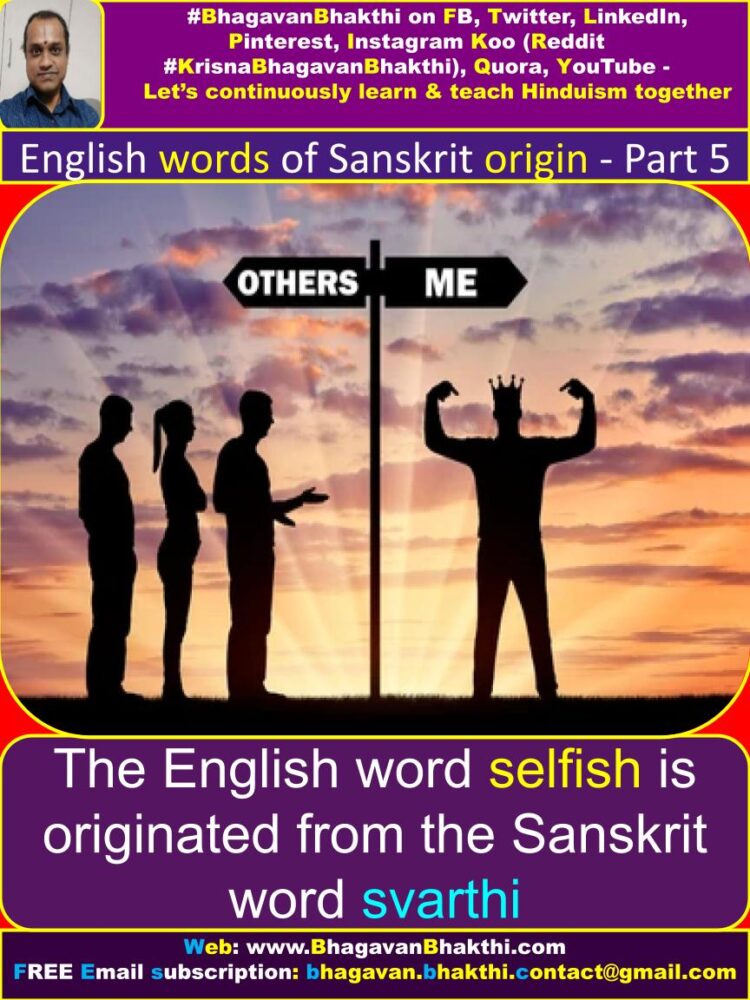
Mean (mean of a list of number – maths students would be aware of this): In Maths many of us must have learnt about this. To know the mean of the list of numbers. Usually the mean comes in the middle of the list of numbers. In Sanskrit middle means ‘madhyama / madhya’. This English word “mean” is a simple form of the Sanskrit word ‘madhya’.
Eyebrow : In Sanskrit eyebrow is known as भ्रू (bhrū). Very clearly the English word is originated from the Sanskrit word.
Nathan : This English name Nathan has the meaning “Gift of God”. In Sanskrit Nathan (नाथन्) has the same meaning. In Sanskrit Natha / Nath (नाथ) means Lord Sri Vishnu and ‘न्’ (n) means given by him or his son.
To watch videos on #Hinduism #Sanskrit language, SUBSCRIBE to my YouTube channel from this below link:
#BhagavanBhakthi YouTube channel
Continue reading to know about “List of English words originated from Sanskrit” from these below links:
List of English words of Sanskrit origin – Part 1 of Part 7
List of English words of Sanskrit origin – Part 2 of Part 7
List of English words of Sanskrit origin – Part 3 of Part 7
List of English words of Sanskrit origin – Part 4 of Part 7
Dear friends, if you need any clarifications about this post, kindly let me know, I will definitely try to answer all of them.
Also your one LIKE, one COMMENT, One Share, one SUBSCRIPTION is highly important.
This will help to know the quality of this content and also it will be helpful to know if any improvements is required for the content.
If you feel this content is useful to you and has helped you to improve your knowledge, kindly share this with your well-wishers.
Because “SHARING MEANS CARING”.
For receive FREE EMAIL SUBSCRIPTION about #BhagavanBhakthi, you can send an email to [email protected] from your email ID.
NAMASTE!
Sri Gurubhyo namaha
Om Sri Krishnaaya namaha
Sri Krishnaarpanamastu